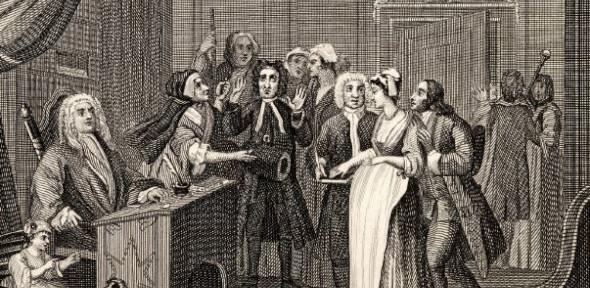Institute of Continuing Education (ICE)

Submitted by Josh Hatley on Thu, 09/05/2019 - 11:59
A new book, by Dr Samantha Williams, ICE Academic Director for History, reveals how society responded to high levels of illegitimacy in the 18th and 19th centuries. It also shows the lengths some errant fathers went to in order to escape not only their moral and financial obligations, but the clutches of parish constables and the feared houses of correction.
Dr Williams, Senior Lecturer in Local and Regional History at ICE, spent 10 years investigating the plight of London’s ‘fallen women’ for her book, Unmarried Motherhood in the Metropolis: 1700-1850.
During the course of her research, Dr Williams unearthed evidence that pregnant women were given a choice of where to give birth and most decided to have their babies at home with a midwife and their friends (called ‘gossips’). Others made use of the new medical care on offer in lying-in hospitals and workhouses, with many pregnant women only turning up at the workhouse gates once they were in labour. “In this respect workhouses functioned like modern maternity hospitals,” says Dr Williams.
Through a prototype ‘Child Support Agency’ operating in towns and villages, parishes wanting to ensure they didn’t end up bearing the burden of illegitimate children pursued errant fathers to make good on their responsibilities. But in London, their success was limited – records indicate that only 20% of these men’s debts were ever collected. In the north of England, 80% was recovered.
"Although parish constables were quite skilled at finding fathers in the first place, they were really pretty bad at getting the money out of them in London,” says Dr Williams. “Men could disappear easily, they could join the navy – I even came across one case where a man fathered five illegitimate children then disappeared off to America and left them all. Lots of men defaulted on payments and ran away. Of those who remained, many were sent to prison to see if they could be squeezed.”
If fathers could not be made to pay up, then the parish maintained the child, sometimes for as long as 15 years.
While attitudes to illegitimacy softened after the Restoration unseated Cromwellian Puritanism, they had begun to harden once again by the early 19th century. Thomas Malthus’ famous 1798 Essay on the Principle of Population painted a bleak future of famine and starvation unless rapid population growth was checked. The influential work helped persuade lawmakers to take a tougher stance on unmarried mothers and heightened the societal shame poured on the women, as Dr Williams notes: “From the 1830s, many more women went into workhouses and it was much harder to get relief. Conservative voices wanted to radically cut the cost of welfare. If they did provide help, it was with a heavy dollop of shame and reform.”
Dr Williams' book, Unmarried Motherhood in the Metropolis: 1700-1850, published by Palgrave MacMillan is available now.
---
This article was originally published as part of the 2019 Lent term edition of Inside ICE.